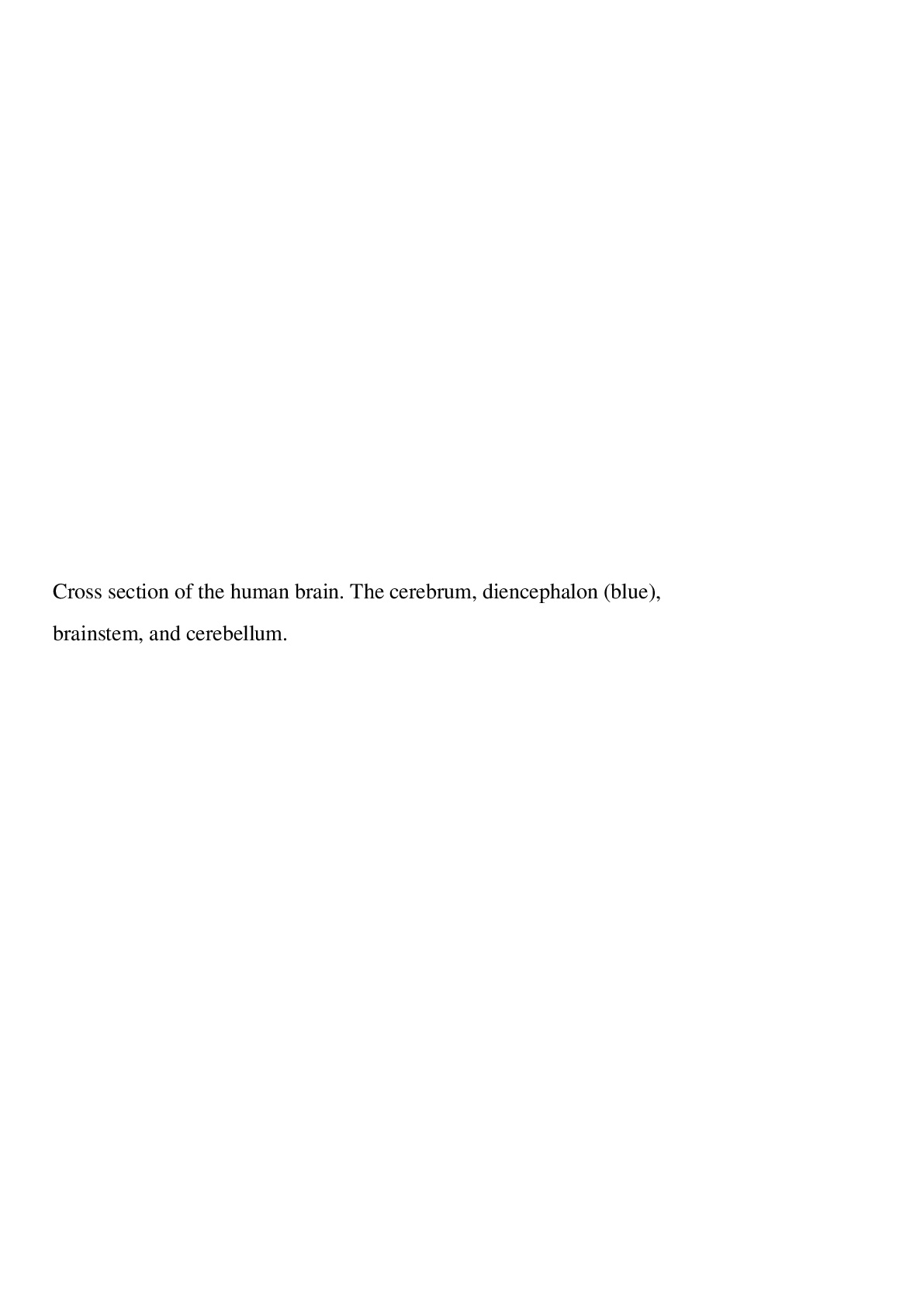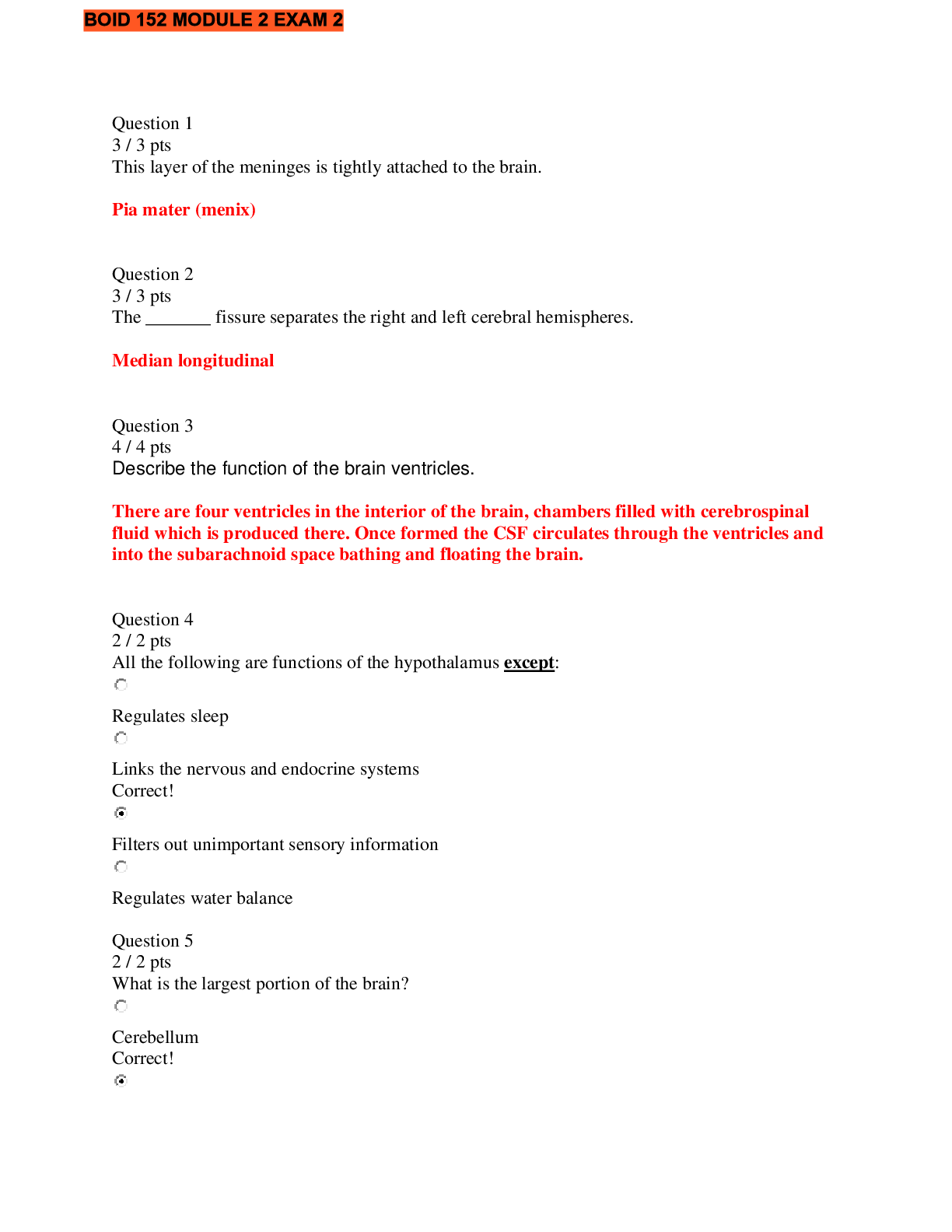Management > QUESTIONS & ANSWERS > SIE Exam Preview Questions with Accurate answers. Speed Recap. 100% Mastery. (All)
SIE Exam Preview Questions with Accurate answers. Speed Recap. 100% Mastery.
Document Content and Description Below
SIE Exam Preview Questions with Accurate answers. Speed Recap. 100% Mastery. 1933 Securities Act (Paper Act) - ✔✔sets forth accounting and disclosure requirements for initial offerings of s... ecurities (stocks and bonds) 1934 Securities and Exchange Commission (SEC) - ✔✔Supervised the country's Stock Commission Exchanges and eliminated dishonest practices Maloney Act of 1938 - ✔✔Allowed self-regulation of securities industry through trade associations such as the National Association of Securities Dealers (NASD) Investment Company Act of 1940 - ✔✔created and regulated mutual funds Investment Advisers Act of 1940 - ✔✔focuses on people and organizations that seek to provide financial advice to investors and defines "investment adviser" Securities Investor Protection Corporation (SIPC) - ✔✔a nonprofit corporation, created by Congress and subject to SEC and congressional oversight, that insures customer accounts against the financial failure of a brokerage firm Employee Retirement Income Security Act (ERISA) - ✔✔Federal law that increased the responsibility of pension plan trustees to protect retirees, established certain rights related to vesting and portability, and created the Pension Benefit Guarantee Corporation Insider Trading and Securities Fraud Enforcement Act of 1988 - ✔✔provides clarification on the penalties for violating insider trading rules that prohibit the use of material non-public information USA Patriot Act - ✔✔Antiterrorism law that allowed the government certain rights to help chase and capture terrorists Dodd-Frank Wall Street Reform and Consumer Protection Act - ✔✔represented an effort to reshape the U.S. regulatory system in the areas of consumer protection, trading restrictions, credit ratings, regulation of financial products, transparency and corporate governance and disclosure Uniform Practice Code (UPC) under FINRA - ✔✔standardizes the dates and times for each type of settlement Rules of Conduct/Fair Practice under FINRA - ✔✔address dealings with the public on the part of brokers/dealers as member firms "you must treat the customer well" Code of Procedures (COP) under FINRA - ✔✔outlines the procedural process in the event of violations of trade practice rules *most important categories of by-laws under FINRA, as it allows FINRA to fine, suspend, bar, expel, or impose any other penalty deemed necessary* Code of Arbitration under FINRA - ✔✔method of resolving disputes (usually money) in the securities business. All decisions are final and binding on all parties Municipal Securities Rule making Board (MSRB) - ✔✔This organization was created in 1975 as an independent self-regulatory organization designed to oversee the municipal securities industry The MSRB is authorized to regulate municipal entities including state/local gov (T/F) - ✔✔F The MSRB is *NOT* authorized to regulate municipal entities such as state/local gov (T/F) - ✔✔T The MSRB has enforcement authority (T/F) - ✔✔F The MSRB has *NO* enforcement authority (T/F) - ✔✔T Department of the Treasury - ✔✔-Collects, borrows, spends, and prints money -Responsible for the overseeing of the U.S. economic/financial systems The IRS is the largest bureau of the Treasury (T/F) - ✔✔T The IRS is *NOT* the largest bureau of the Treasury (T/F) - ✔✔F Fidelity Bond (Blanket Fidelity Bond) - ✔✔insurance policy that pays the employer money in the case of employees' theft The FDIC protects customers funds up to what amount? a. $100,000 b. $200,000 c. $250,000 d. $500,000 - ✔✔c. What is the minimum coverage requirement of a Fidelity Bond? a. $100,000 b. $200,000 c. $250,000 d. $500,000 - ✔✔a. How much does the SIPC cover for an individual in credit/cash? a. Credit $1 mil. - Cash $500,000 b. Credit $750,000 - Cash $100,000 c. Credit $500,000 - Cash $250,000 d. Credit $250,000 - Cash $100,000 - ✔✔c. Accredited Investor - ✔✔person who is permitted to invest in higher-risk investments such as business start-ups (natural person earning steady income over past 2 years) Retail Investor - ✔✔A retail investor is an individual investors who buy and sell securities for their personal account, and not for another company or organization A Market Maker assumes risk of holding inventory (T/F) - ✔✔T A Market Maker does not assume risk of holding inventory (T/F) - ✔✔F In the event of a stock-split, what kind of agent is responsible for maintaining a record of the shareholders that will receive additional shares? a. Custodian b. Underwriters c. Depositories d. Transfer Agent - ✔✔d. A Block Trade consists of how many shares/TMV? a. 1,000 shares - $10,000 TMV b. 10,000 shares - $100,000 TMV c. 10,000 shares - $150,000 TMV d. 10,000 shares - $200,000 or more in TMV - ✔✔d. Consolidated Tapes - ✔✔an electronic system that reports the latest price/volume data on a sales of exchange-listed stocks How much does an institutional investor need to have in assets to be a Qualified Institutional Buyer(QIB)? a. $50,000 b. $100,000 c. $1 mil. d. $100 mil. - ✔✔d. S-1 - ✔✔Registration for most IPOs (also known as *registration statement*) S-3 (Abbreviated Registration Statement) - ✔✔If an issue is an "add-on" offering, the issuer can qualify for this A "Tombstone" notifies details concerning an offering including what? a. Probable price range b. Description of the issue c. Members of the syndicate d. All the above - ✔✔d. During a restricted period, a corporation falling under Tier-2 requires what avg. daily trading volume (ADTV)/public float value? a. ADTV exceeds $1 mil. - Public Float exceeds $150 mil. b. ADTV is at least $100,000 - Public Float is at least $25 mil. c. ADTV less than $100,000 - Public Float is less than $100,000 d. No ADTV - No Public Float - ✔✔b. During a restricted period, a corporation falling under Tier-1 requires what avg. daily trading volume (ADTV)/public float value? a. ADTV exceeds $1 mil. - Public Float exceeds $150 mil. b. ADTV is at least $100,000 - Public Float is at least $25 mil. c. ADTV less than $100,000 - Public Float is less than $100,000 d. No ADTV - No Public Float - ✔✔a. During a restricted period, a corporation falling under Tier-3 requires what avg. daily trading volume (ADTV)/public float value? a. ADTV exceeds $1 mil. - Public Float exceeds $150 mil. b. ADTV is at least $100,000 - Public Float is at least $25 mil. c. ADTV less than $100,000 - Public Float is less than $100,000 d. No ADTV - No Public Float - ✔✔c. What is the restricted period for a Tier-1 corporation prior to the effective date? a. 1 day b. 5 days c. 10 days d. no restriction - ✔✔d. What is the restricted period for a Tier-2 corporation prior to the effective date? a. 1 day b. 5 days c. 10 days d. no restriction - ✔✔a. What is the restricted period for a Tier-3 corporation prior to the effective date? a. 1 day b. 5 days c. 10 days d. no restriction - ✔✔b. How long is the cooling off period? a. 3 days b. 10 days c. 20 days d. 90 days - ✔✔c. Effective Date - ✔✔When the cooling off period ends Quiet Period - ✔✔time period after prospectus is filed when company must restrict what is said about the company FINRA Rule 5280 - ✔✔members may not use nonpublic, advanced knowledge of an upcoming research report/its content for their own benefit/that of another person Regulation M - ✔✔The SEC restricts distribution participants (underwriters and issuers) from bidding for or making secondary market purchases of the stock that is being offered in a distribution What is the punishment for defying Regulation M(committing insider trading)? a. 2x loss avoided/profit made b. 3x loss avoided/profit made c. 4x loss avoided/profit made d. Strictly just banned from trading - ✔✔b. State registration - ✔✔-The securities, the underwriters, and the bankers themselves must all be appropriately registered in all states where the securities are sold -These state securities laws are referred to as "blue sky" laws What 3 methods are there to register a security? a. Notification b. Coordination c. Qualification d. All of them - ✔✔d. A "secondary market" represents an *auction* market (T/F) - ✔✔T A "secondary market" represents a *negotiation* market (T/F) - ✔✔F Within the "secondary market", what does the *First* market trade? a. Trading of securities listed on a exchange b. Trading of unlisted securities OTC c. Listed Securities trading OTC d. Electronic trading of large blocks between institutional investors (instinet) - ✔✔a. Within the "secondary market", what does the *Second* market trade? a. Trading of securities listed on a exchange b. Trading of unlisted securities OTC c. Listed Securities trading OTC d. Electronic trading of large blocks between institutional investors (instinet) - ✔✔b. Within the "secondary market", what does the *Third* market trade? a. Trading of securities listed on a exchange b. Trading of unlisted securities OTC c. Listed Securities trading OTC d. Electronic trading of large blocks between institutional investors (instinet) - ✔✔c. Within the "secondary market", what does the *Fourth* market trade? a. Trading of securities listed on a exchange b. Trading of unlisted securities OTC c. Listed Securities trading OTC d. Electronic trading of large blocks between institutional investors (instinet) - ✔✔d. Regulation D - ✔✔-regulation and exemption for reports and statements required for selling stock to private parties based on the amount of money being raised -Private Placement What FINRA rule are IPO's subject to? a. Rule 2269 b. Rule 2262 c. Rule 5130 d. Rule 147 - ✔✔c. FINRA Rule 2262 Specify's what? a. when a broker/dealer receives a fee for advising a customer on a primary/secondary offering, it must provide written notification of participation on interest before completing the transaction b. any broker/dealer must disclose the relationship in writing at/before completing purchase/sale transaction c. prohibits brokers/dealers and their employees from buying an IPO from a syndicate - ✔✔b. FINRA Rule 2269 specify's what? a. when a broker/dealer receives a fee for advising a customer on a primary/secondary offering, it must provide written notification of participation on interest before completing the transaction b. any broker/dealer must disclose the relationship in writing at/before completing purchase/sale transaction c. prohibits brokers/dealers and their employees from buying an IPO from a syndicate - ✔✔a. FINRA Rule 5130 specify's what? a. when a broker/dealer receives a fee for advising a customer on a primary/secondary offering, it must provide written notification of participation on interest before completing the transaction b. any broker/dealer must disclose the relationship in writing at/before completing purchase/sale transaction c. prohibits brokers/dealers and their employees from buying an IPO from a syndicate - ✔✔c. How long does a Shelf Offering last? a. 90 days b. 1 year c. 2-3 years d. 5+ years - ✔✔c. Under Regulation A+, what qualifies a Tier-1 offering? a. offering up to $5 mil., w/in a 6 month period b. offering up to $20 mil, w/in 1 year period c. offering up to $50 mil., w/in a 1 year period d. offering up to $100 mil., w/in a 1 year period - ✔✔b [Show More]
Last updated: 2 years ago
Preview 1 out of 74 pages
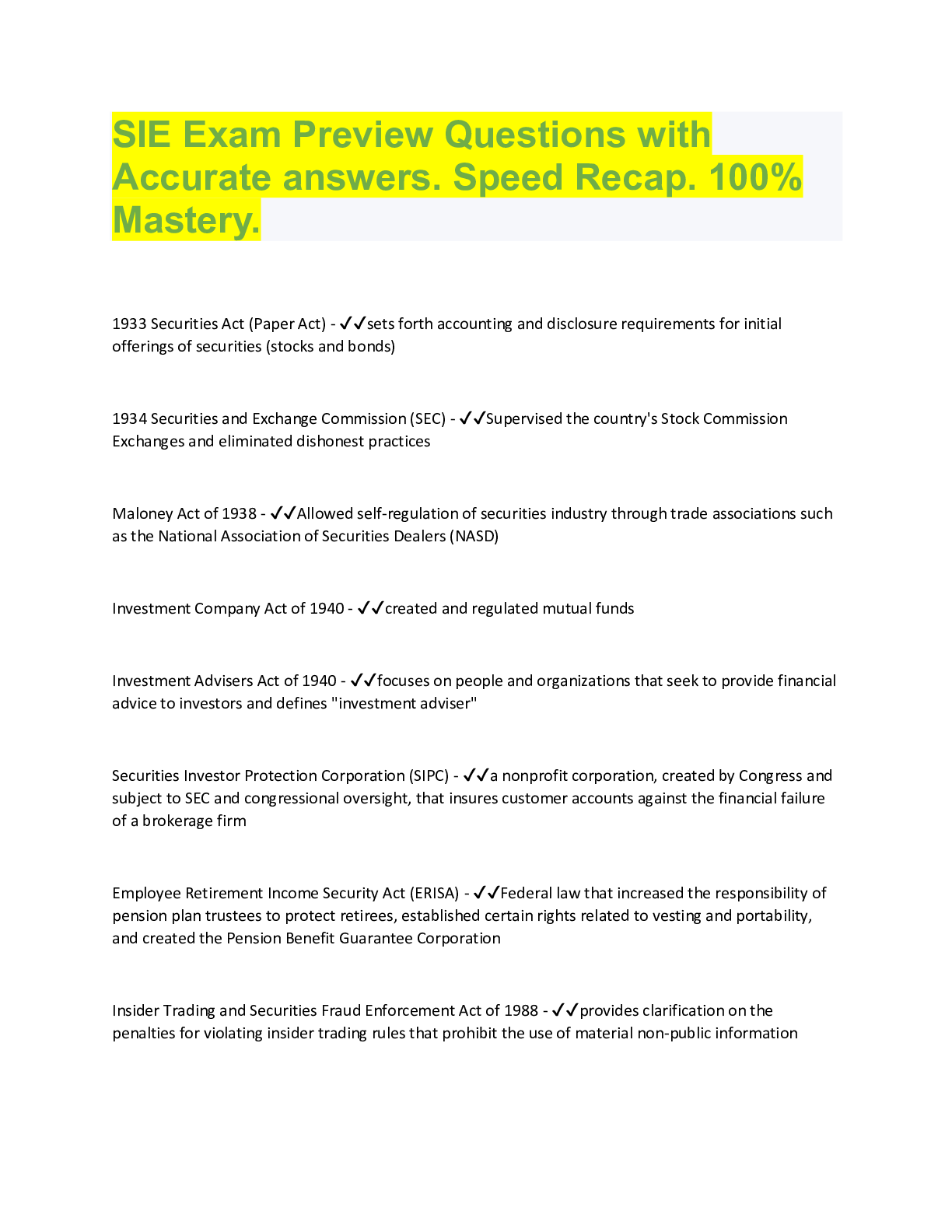
Buy this document to get the full access instantly
Instant Download Access after purchase
Buy NowInstant download
We Accept:

Reviews( 0 )
$12.00
Can't find what you want? Try our AI powered Search
Document information
Connected school, study & course
About the document
Uploaded On
Mar 17, 2023
Number of pages
74
Written in
Additional information
This document has been written for:
Uploaded
Mar 17, 2023
Downloads
0
Views
105

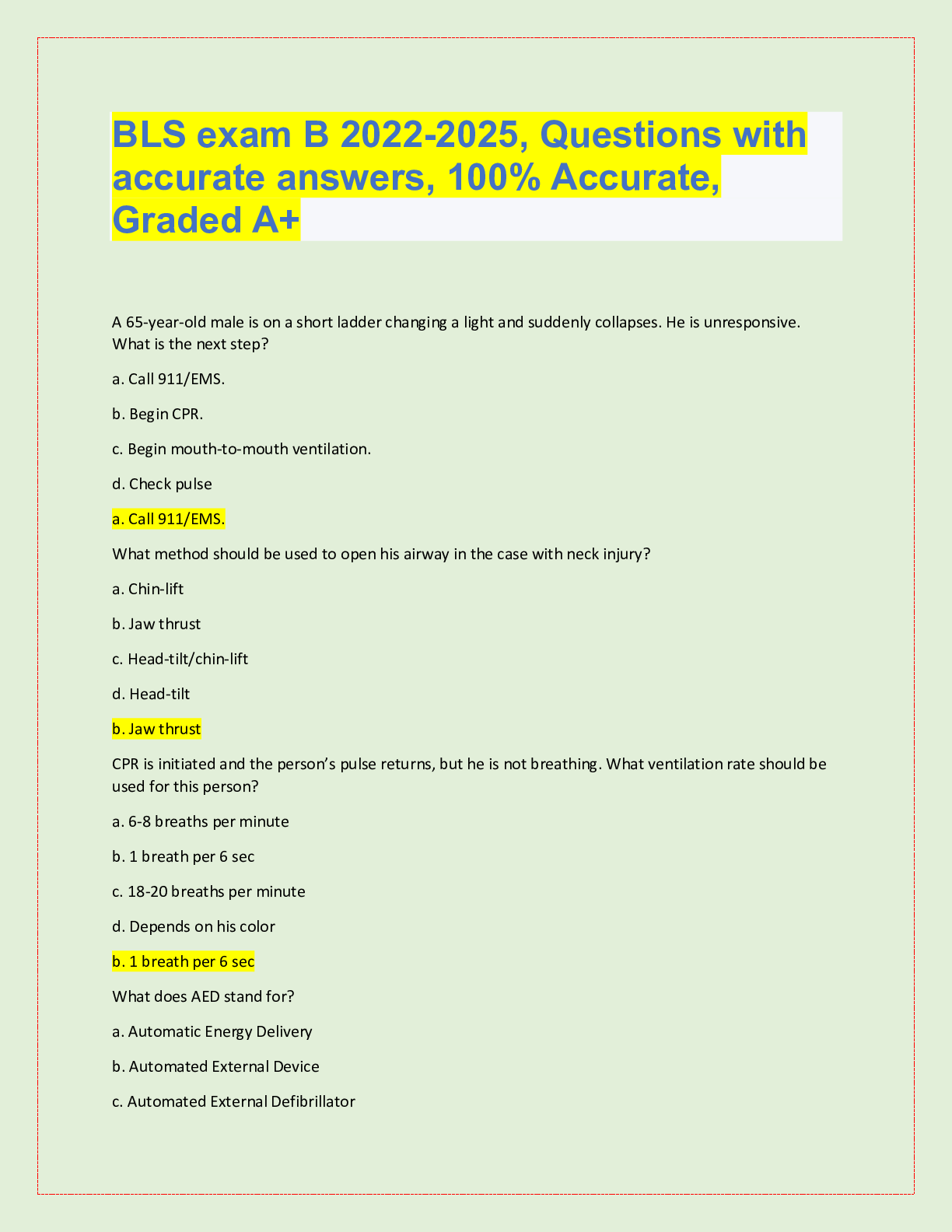











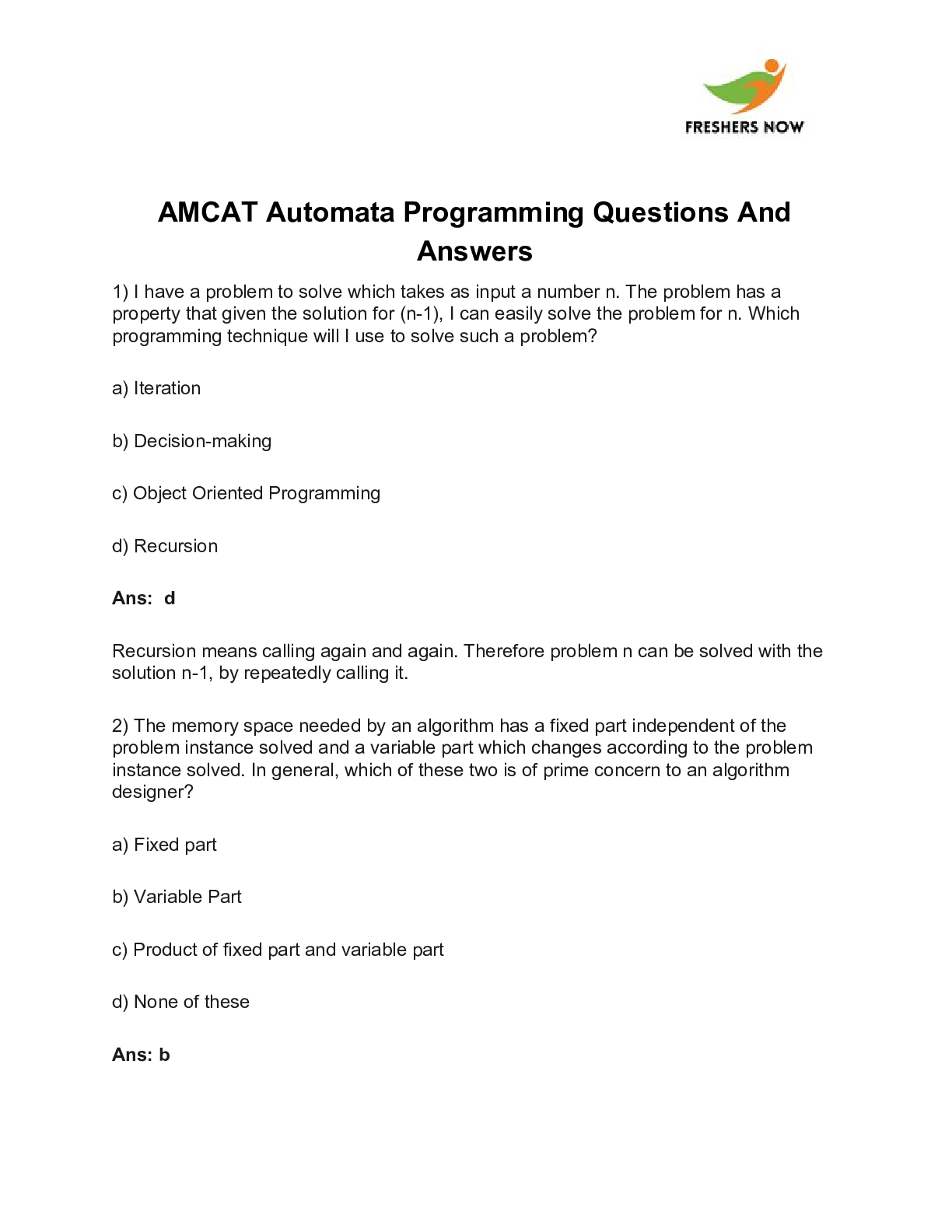
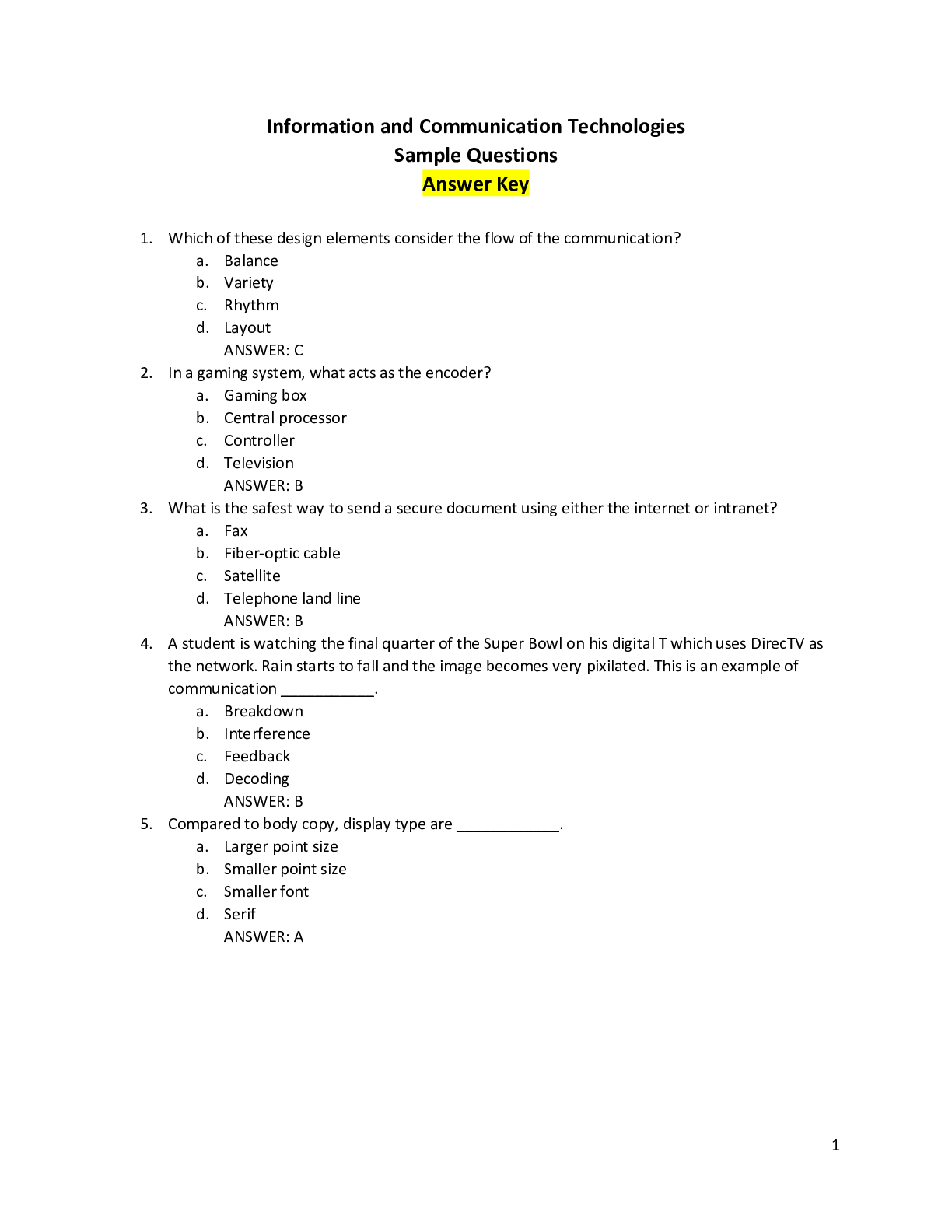
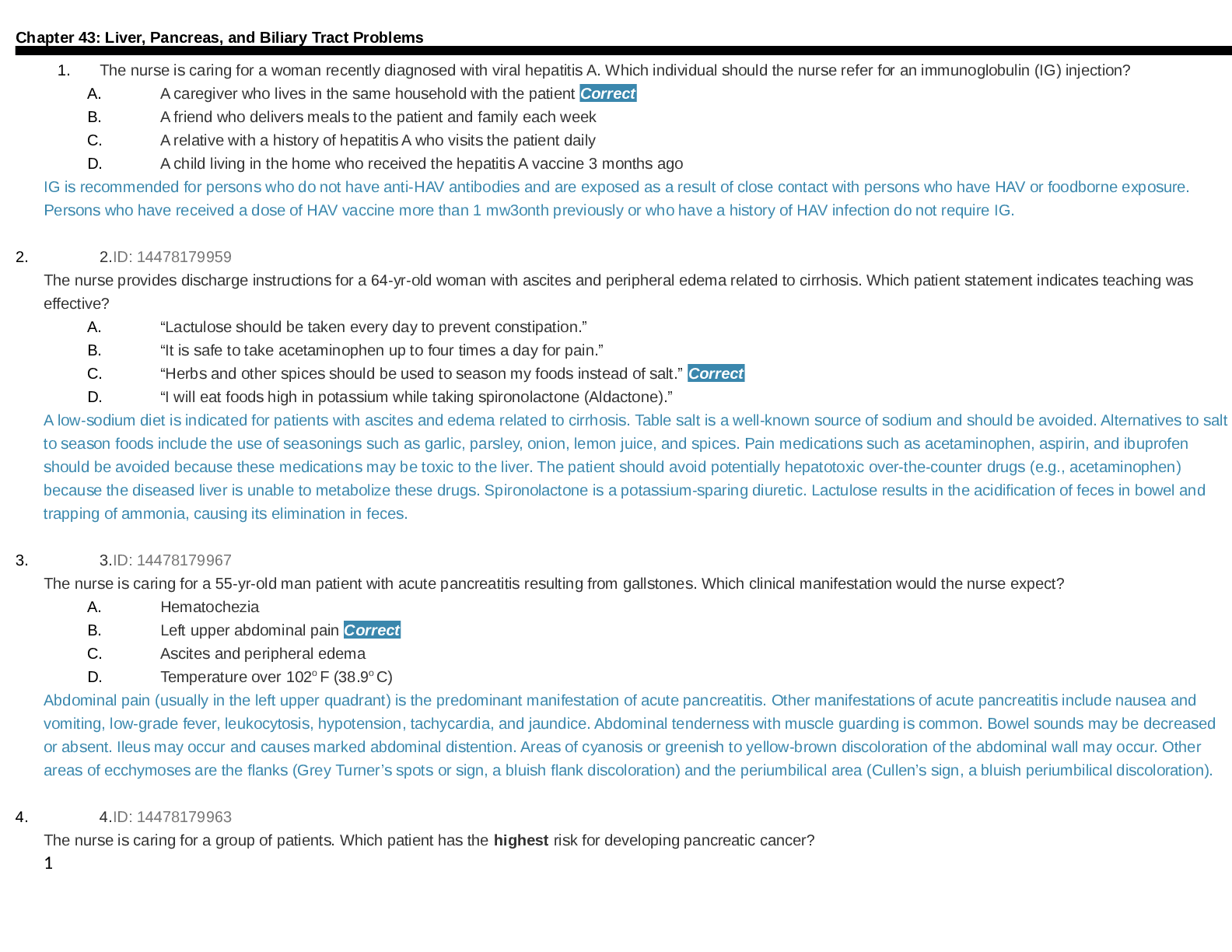
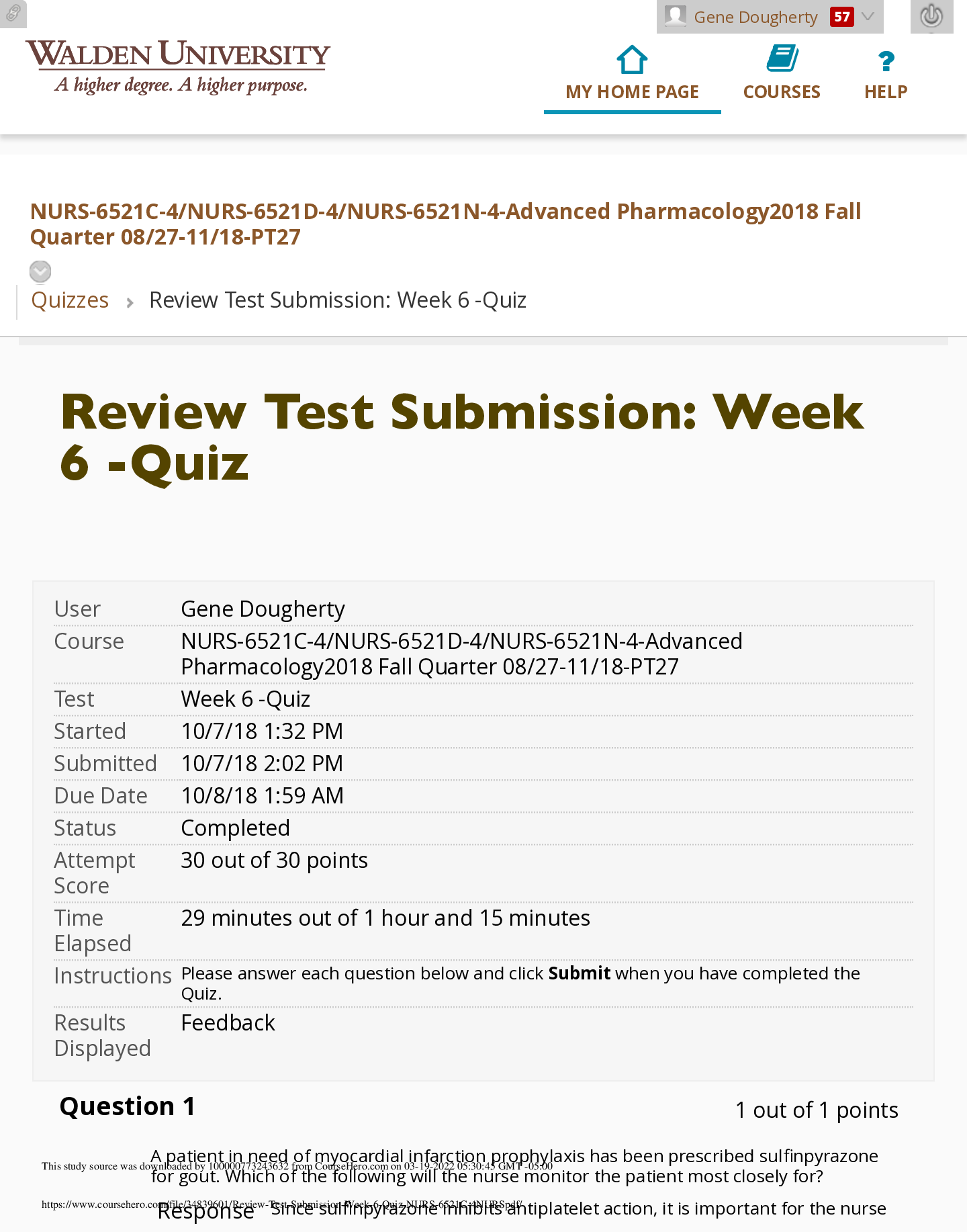

.png)

